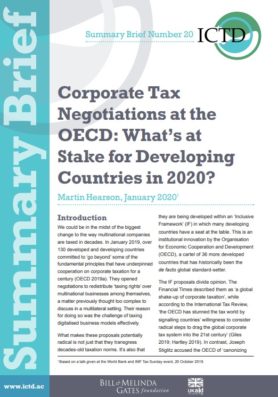Summary Brief 20
We could be in the midst of the biggest change to the way multinational companies are taxed in decades. In January 2019, over 130 developed and developing countries committed to ‘go beyond’ some of the fundamental principles that have underpinned cooperation on corporate taxation for a century (OECD 2019a). They opened negotiations to redistribute ‘taxing rights’ over multinational businesses among themselves, a matter previously thought too complex to discuss in a multilateral setting. Their reason for doing so was the challenge of taxing digitalised business models effectively. What makes these proposals potentially radical is not just that they transgress decades-old taxation norms. It’s also that they are being developed within an ‘Inclusive Framework’ (IF) in which many developing countries have a seat at the table. This is an institutional innovation by the Organisation for Economic Cooperation and Development (OECD), a cartel of 36 more developed countries that has historically been the de facto global standard-setter. The IF proposals divide opinion. The Financial Times described them as ‘a global shake-up of corporate taxation’, while according to the International Tax Review, ‘the OECD has stunned the tax world by signalling countries’ willingness to consider radical steps to drag the global corporate tax system into the 21st century’ (Giles 2019; Hartley 2019). In contrast, Joseph Stiglitz accused the OECD of ‘canonizing gradualism’, while civil society groups such as Tax Justice Network Africa and ActionAid believe that the proposals ‘will not adequately address underlying global issues surrounding tax evasion and IFFs [illicit financial flows]’ (Stiglitz 2019; Tax Justice Network Africa and ActionAid Denmark 2019). The BEPS Monitoring Group considers them ‘unnecessarily complex’ and has called for a more comprehensive approach (BEPS Monitoring Group 2019). At the time of writing, the OECD is struggling to hold together a coalition that includes powerful emerging markets such as India, impatient European countries such as France, and an increasingly belligerent United States. The challenge of brokering an agreement among these powerful states is one reason to lower expectations about what the evolving proposals can deliver for developing countries, even though many of them are at the table. Participation in whatever agreement emerges will entail real costs and risks, which must be evaluated against what appear limited potential gains. But there is also much to play for, in this process itself and in the precedents it sets. This paper describes the proposals as they stand, and highlights some of the issues for developing countries. It draws on discussions with developing country negotiators and other participants in the IF discussions between July 2019 and January 2020, as well as their published comments.
